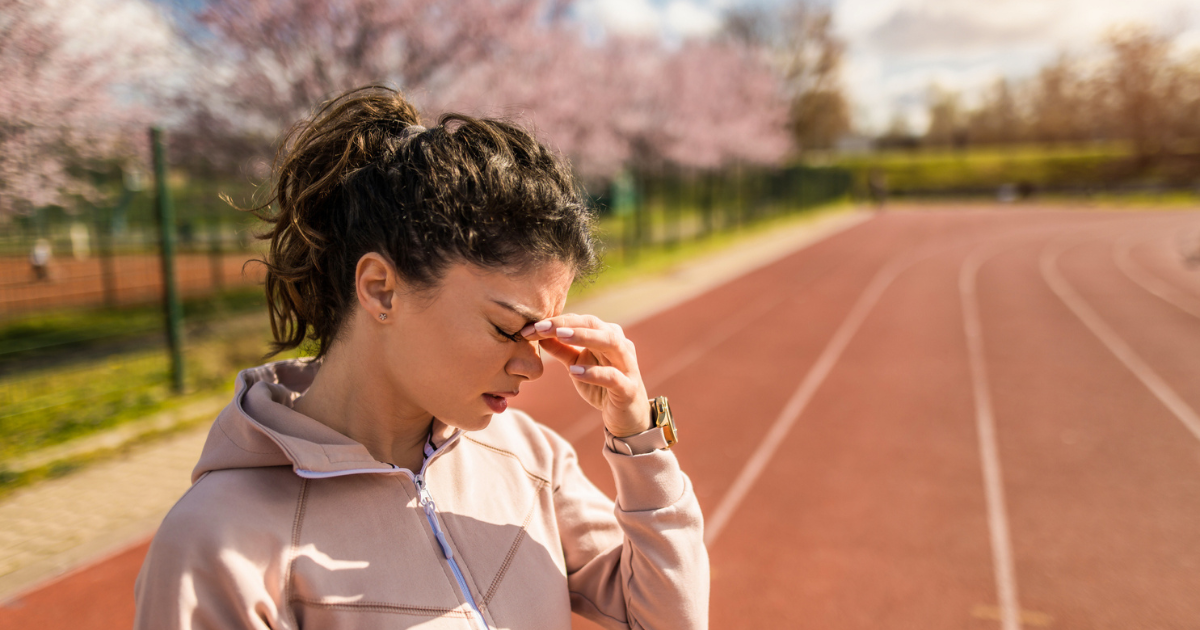Are headaches triggered by weather changes?

What causes your headaches? Fluctuating weather can trigger headaches for some people. Learn about the relationship between weather changes and neurological conditions.
One day it’s snowing and 10 degrees. The next, it’s sunny and 70 degrees. Drastic weather changes mean oncoming migraines or headaches for some and can act as an early warning. But is there a correlation? Does the change in pressure impact headaches or other neurological conditions?
Neurologist Elizabeth Hartman, MD, helps individuals with neurological disorders, focusing on multiple sclerosis (MS) and headaches, including migraines. She also works with patients with spasticity, myasthenia gravis, and neuropathy, all of which can be impacted by heat or cold.
“Our patients with MS experience changes in symptoms with the weather; in particular, heat transiently worsens old symptoms, referred to as Uhtoff’s phenomenon,” says Dr. Hartman. “Before CT scans and MRIs were available, MS diagnosis was sometimes confirmed by evaluating for worsening of patient symptoms after a hot bath.”
Some individuals with neuropathy may also notice an intolerance to heat. Patients with epilepsy who have a fever with an infection may see an increase in seizures, but the weather doesn’t have an impact. Cold may transiently improve weakness related to myasthenia gravis, and heat can increase myasthenia-related weakness. Individuals with spasticity related to neurological disorders such as cerebral palsy, stroke, MS or spinal cord injuries commonly note increased muscle stiffness with cold weather.
Barometric pressure means the weight of the air. It falls when the weather is humid and rises when it’s dry. When the barometric pressure changes, it can create pressure between the sinuses resulting in a chemical imbalance and headache. A shift in weather can worsen an existing headache or migraine.
“Many individuals with headaches say weather changes trigger headaches, especially in individuals with migraine headaches,” says Dr. Hartman. “The most common weather-related trigger is rapid changes in barometric pressure with storms. However, bright sunlight, cloudy days and extreme temperatures can also be triggers.”
For some, weather changes or weather-related triggers can also cause an imbalance in brain chemicals, such as serotonin, prompting a migraine. Other weather-related triggers include dry air, high humidity, wind and sun glare.
Dr. Hartman explains that migraine is a neurological disorder that often runs in families, and having one parent who suffers from migraine is associated with a 50% chance of having migraines. In addition to weather changes, hormones impact headaches, especially in women.
“Estrogen fluctuations can cause headaches in women, referred to as menstrual migraines,” says Dr. Hartman. “Menstrual migraines occur around the onset of menses and may not respond as well to medications. For many women, migraines improve during pregnancy and substantially after menopause.”
There are over 150 types of headaches, and all of them are treatable. Tension headaches are the most common and range from mild to moderate. Migraines occur in at least 1 in 10 people and can disrupt daily activities, sometimes worsening with light or sound.
Patients with migraines who feel triggered by the weather should talk to their doctor about their symptoms. Severe headache pain that doesn’t respond to over-the-counter medications may benefit from prescription treatments.
“If you’re struggling, you may benefit from seeing a headache medicine specialist to help you get control of your symptoms,” says Dr. Hartman. Nebraska Medicine is home to four of the seven certified headache medicine specialists in the state of Nebraska. We use a multidisciplinary approach to headache care with neurologists, pain medicine providers, anesthesiologists, neurosurgeons, ear, nose and throat providers, oral maxillary facial surgeons, physical therapists, psychologists and other experts to provide individualized, comprehensive headache care.
Rescue medication for migraines or headaches should be taken at the onset of symptoms. Patients can lessen the effects by drinking enough water, getting enough sleep, eating healthy foods, monitoring weather changes and avoiding triggers if possible. Keeping a headache or migraine journal can also help you see correlations between weather fluctuations and headache symptoms.
Are you experiencing neurological conditions? We can help! Give us a call at 800.922.0000 or visit NebraskaMed.com/Neurological-care.







